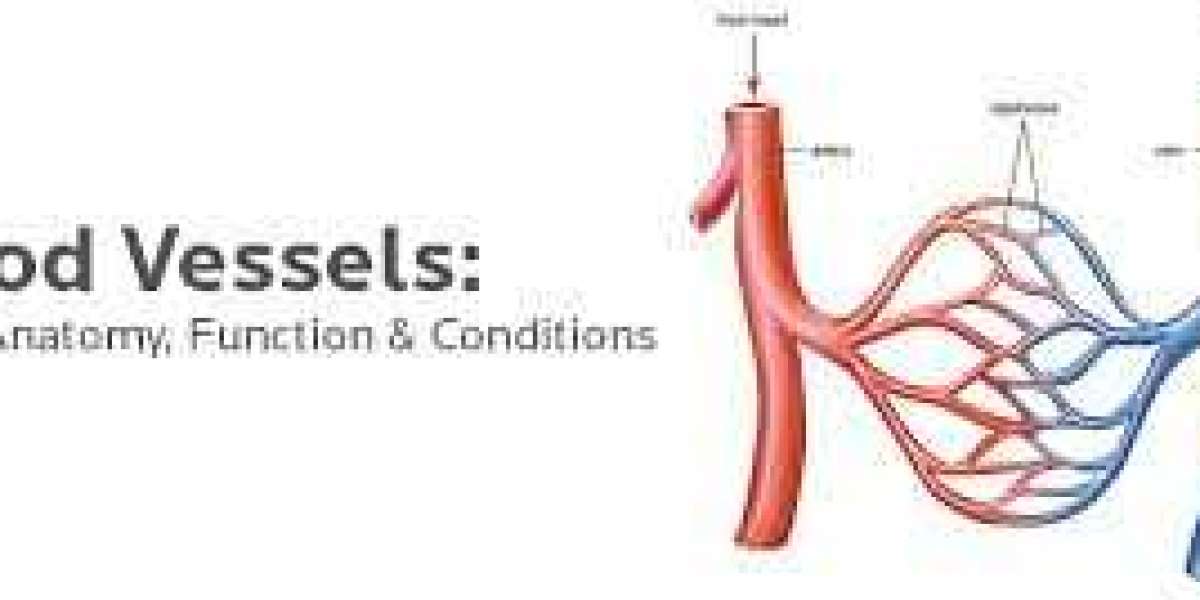Blood vessels play a crucial role in the body's circulatory system, serving as the channels through which blood flows to and from the heart, delivering oxygen, nutrients, and hormones to cells while removing waste products. Healthy blood vessels are essential for overall well-being, and any disruption in their function can lead to serious health problems. In this blog, we will explore the types of blood vessels, their functions, common issues that affect them, and how to maintain their health.
What Are Blood Vessels?
Blood vessels are flexible tubes that carry blood throughout the body. They are a critical part of the circulatory system, which consists of the heart, blood vessels, and blood. The primary types of blood vessels are arteries, veins, and capillaries, each with specific functions that contribute to maintaining a healthy blood flow.
Arteries: These blood vessels carry oxygen-rich blood from the heart to various parts of the body. Arteries have thick, muscular walls that allow them to withstand the high pressure from the heart's pumping action.
Veins: Veins return oxygen-poor blood back to the heart. Unlike arteries, veins have thinner walls and often contain valves that prevent blood from flowing backward, ensuring it moves in one direction.
Capillaries: These tiny blood vessels connect arteries and veins. They are responsible for the exchange of oxygen, carbon dioxide, nutrients, and waste products between the blood and the body’s cells. The walls of capillaries are extremely thin, allowing for this exchange.
The Role of Blood Vessels in Health
Blood vessels are vital for maintaining the body’s homeostasis. They carry oxygen and nutrients to the organs and tissues, while also helping to remove metabolic waste products like carbon dioxide and urea. Additionally, blood vessels help regulate body temperature, fight infections, and contribute to the healing process after injury. The smooth function of these vessels ensures the proper delivery of essential substances to cells, supporting the body’s overall function.
Common Issues Affecting Blood Vessels
Several health conditions can affect the blood vessels, disrupting their normal function and leading to complications. Some of the most common vascular issues include:
Atherosclerosis: This is the buildup of fatty deposits (plaques) inside the arteries, causing the walls to become thick and stiff. Over time, atherosclerosis can restrict blood flow, increasing the risk of heart attack, stroke, and other cardiovascular diseases.
Varicose Veins: These are swollen, twisted veins that often appear on the legs. Varicose veins occur when the valves in the veins become weakened or damaged, causing blood to pool instead of flowing smoothly.
Hypertension (High Blood Pressure): High blood pressure puts excessive strain on the blood vessel walls, increasing the risk of artery damage, heart disease, and kidney issues. Chronic hypertension can weaken and narrow the arteries, leading to a reduced flow of blood.
Peripheral Artery Disease (PAD): This condition occurs when the arteries that supply blood to the limbs become narrowed or blocked, often due to atherosclerosis. PAD can lead to pain, numbness, and in severe cases, tissue death in the affected areas.
Blood Clots: Clots can form in the blood vessels, obstructing blood flow and causing conditions like deep vein thrombosis (DVT) or pulmonary embolism (PE), where a clot travels to the lungs, posing a life-threatening risk.
Factors Affecting the Health of Blood Vessels
Several factors can influence the health of blood vessels, many of which are related to lifestyle choices. The key factors include:
Diet: A diet high in saturated fats, cholesterol, and sodium can contribute to plaque buildup in the arteries. Consuming a diet rich in fruits, vegetables, whole grains, and healthy fats can help maintain healthy blood vessels.
Exercise: Regular physical activity is essential for maintaining the health of blood vessels. Exercise helps improve circulation, reduce inflammation, and lower blood pressure, all of which promote healthy vessels.
Smoking: Smoking damages the walls of the blood vessels and contributes to the development of atherosclerosis. Quitting smoking can significantly improve vascular health and reduce the risk of related diseases.
Chronic Conditions: Health conditions like diabetes and high cholesterol can damage blood vessels over time. Managing these conditions effectively through medication, lifestyle changes, and regular monitoring is essential for protecting vascular health.
Stress: Chronic stress can increase blood pressure and contribute to vessel damage. Practicing stress management techniques like meditation, deep breathing, and relaxation can help reduce its impact on blood vessels.
How to Maintain Healthy Blood Vessels
Maintaining healthy blood vessels is crucial for overall well-being. Here are some tips to promote vascular health:
Eat a Heart-Healthy Diet: Focus on foods that are rich in antioxidants, omega-3 fatty acids, and fiber. Incorporate plenty of leafy greens, whole grains, nuts, and seeds into your diet while limiting processed foods and excessive salt.
Stay Active: Regular exercise, such as walking, cycling, or swimming, can help keep blood vessels flexible and improve circulation. Aim for at least 30 minutes of moderate-intensity exercise most days of the week.
Quit Smoking: If you smoke, quitting is one of the best things you can do for your vascular health. Smoking accelerates the development of atherosclerosis and damages blood vessels.
Control Blood Pressure and Cholesterol: Monitor your blood pressure and cholesterol levels regularly. If they are elevated, work with a healthcare provider to develop a plan for managing these levels through diet, exercise, and medication if necessary.
Stay Hydrated: Drinking plenty of water helps maintain proper blood flow and supports the function of the vascular system.
Manage Stress: Chronic stress can take a toll on your blood vessels. Incorporate stress-relieving activities into your daily routine to help reduce the impact of stress on your vascular health.
Medications and Treatments: In some cases, medications may be prescribed to help manage conditions that affect blood vessels, such as high blood pressure, cholesterol, or erectile dysfunction. For example, Cenforce 200mg, primarily used for erectile dysfunction, works by improving blood flow, which can benefit individuals with vascular-related issues, although it should always be used under medical supervision.
Conclusion
Blood vessels are vital components of the circulatory system that ensure proper blood flow throughout the body. Maintaining the health of your blood vessels is essential for overall well-being and preventing a variety of serious health issues. By adopting a healthy lifestyle, managing chronic conditions, and seeking timely medical advice when necessary, you can help protect your blood vessels and keep your circulatory system functioning optimally.



